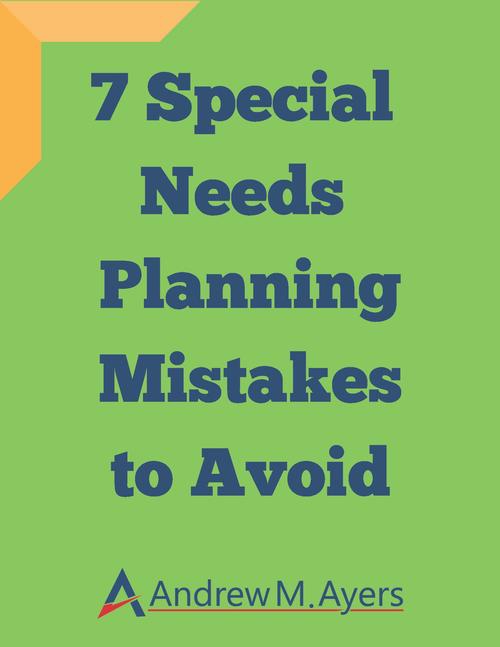 If you have a child with special needs, special needs planning by creating a trust can be the most important part of your legacy you can leave for them. We all hope that our children will outlive us and have a long and enjoyable life. When your child has special needs and is receiving government benefits, it is unfortunately not enough to just leave them an inheritance in your will. A basic will that you download from a website can actually cause them to lose their benefits and without the proper structure around them, leave them adrift without the support network they have become accustomed to and depend upon. A properly created special needs trust will give your child supplemental benefits in addition to their government benefits.
If you have a child with special needs, special needs planning by creating a trust can be the most important part of your legacy you can leave for them. We all hope that our children will outlive us and have a long and enjoyable life. When your child has special needs and is receiving government benefits, it is unfortunately not enough to just leave them an inheritance in your will. A basic will that you download from a website can actually cause them to lose their benefits and without the proper structure around them, leave them adrift without the support network they have become accustomed to and depend upon. A properly created special needs trust will give your child supplemental benefits in addition to their government benefits.
What is a Special Needs Trust?
A special needs trust is a specific type of trust that is designed to manage the assets for a person with special needs so that they continue to receive their governmental benefits. If you've never created a trust before (or you've managed to avoid the many books and podcasts that recommend a trust to all of their listeners and readers), it is commonly used in estate planning to provide a way to manage your assets for others after you've died. If you're involved with a trust, it's usually in one of three ways:
- Grantor - the person supplying the funds for the trust;
- Trustee - the person or institution managing the funds;
- Beneficiary - the person who is benefitting from the funds in the trust.
The trust is created by a document, sometimes a very long and complex document, that says what the grantor wants to do with the funds, how the trustee is to manage and distribute the funds to the beneficiary and how or when the trust is to end.
Types of Special Needs Trusts
There are three common types of special needs trusts. When you are considering creating one, there can be advantages and disadvantages to each one, and it's important that you do some research and work with professionals to create the right type for you and your family.
- First-Party Special Needs Trust ~ this type of trust holds assets that belong to the person with special needs (things like an inheritance or proceeds from a lawsuit settlement) and upon the death of the person with special needs, the government is entitled to take whatever's leftover under a concept known as estate recovery.
- Third-Party Special Needs Trust ~ this type of trust has funds that belong to other people and are being used to help the person with special needs.
- Pooled Trusts ~ this type of trust holds funds from many different people with special needs. It is often set up by a charity to allow multiple people to put their resources together and when they die, a portion goes to the government and a portion goes to the charity.
While there are three options, it is most common that the clients I work with prepare third-party special needs trusts. As you can probably guess, the most important consideration for many of them is that they do not want the remaining assets to be recovered by the government when the trust terminates. By using a third-party special needs trust, you are able to fund it with almost any type of asset, including real estate, investments, insurance and other assets. And when the person with special needs dies, the remaining assets can then be transferred to other family members (or other beneficiaries) without having to repay the government.
Can I Establish a Special Needs Trust?
Anyone can create a special needs trust - the person with special needs does not need to be your child or a direct relative. They are a great way to help provide for someone who can use some extra support and is not able to manage their affairs on their own. Especially if they are receiving government benefits, the trust is a way to leave a lasting legacy for their care and support.
You May Also Like
- Talking with Your Family About Your Will
- What is a Testamentary Trust
- What is Simultaneous Death in an Estate Plan?
Next Steps
If you have a child with special needs, you likely understand the complexity of dealing with government benefits and wouldn't want to leave that burden to your child without a proper plan in place. To get started, let's set up a complimentary Legal Strategy Session to discuss the best options for you and your family.


